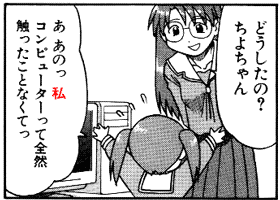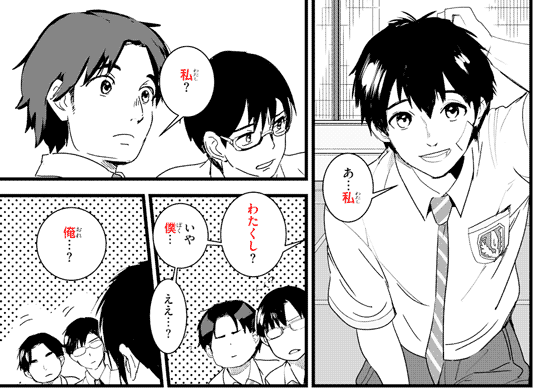In Japanese, watashi 私 means "I" or "me." It's one of the various Japanese first person pronouns. It's considered polite and feminine in casual contexts, but neutral in formal contexts.
Meaning
The word watashi translates to "I" or "me" depending on whether it's the subject or object of the clause.
- watashi wa Tarou desu
私は太郎です
I'm Tarou. - watashi ni oshiete
私に教えて
Teach [it] to me.
Tell me about [it].- oshiete - te-form of oshieru 教える, "to teach."
Often you don't need to explicitly use a first person pronoun, so just Tarou desu and oshiete would have the same meaning as the phrases above.
See first person pronouns for details on grammar.
The phrase watashi no 私の means "my" or "mine."
See also: no の particle.
- watashi no namae wa Tarou desu
私の名前は太郎です
My name is Tarou. - sore wa watashi no desu
それは私のです
That is mine.
The phrase watashi-tachi 私達 means "we" or "us."
See also: tachi 達 pluralizing suffix.
- watashi-tachi wa ningen desu
私達は人間です
We are human. - watashi-tachi wo shinjite
私達を信じて
Believe us.
Kanji
The word watashi 私 is normally spelled with kanji.
It's sometimes spelled with hiragana instead, as watashi わたし, when it's used by children, mostly due to aesthetics.
It's also spelled with katakana, as watashi ワタシ, when the character is a foreigner speaking Japanese, in order to reflect their stiff, non-native pronunciation of the language.
The kanji of watashi means "private," as seen in:
- shiyou
使用
For "private use." - shiritsu
私立
Private establishment. (e.g. a private school.)
Originally, this kanji was read as watakushi 私. More specifically, watashi is a relaxed pronunciation of the word watakushi.(デジタル大辞泉)
Both words mean the same thing, but nowadays watashi is normally used, and watakushi sounds stiff and formal by comparison. One exception is when watakushi is used as a verb, then watashi doesn't have the same meaning:
- watakushi suru
私する
To embezzle. (in the sense of making public funds private, etc.)
A further relaxed pronunciation is the word atashi あたし, which doesn't have the same formal usage as watashi, carrying only its feminine nuance.
Nuances
In most of Japan, the pronoun watashi is feminine in casual contexts, but gender neutral in formal contexts.
If you're male, you may sound a bit weird if you use watashi when you shouldn't, but the meaning of the word doesn't change, neither does the grammar, so people will understand what you're saying.
If you're female, you have nothing to worry about, you can use watashi all the time.
- doushita no?
どうしたの?
[What happened]? - Chiyo-chan
ちよちゃん - a ano', watashi φ
{konpyuutaa tte zenzen
sawatta} koto nakute'
あ あのっ 私 コンピューターって全然触ったことなくてっ
[Y... you see,] I've never {touched a computer}.
- ~koto nai
~ことない
To have never done [something].
- ~koto nai
For this reason, watashi is considered to be the most "normal" first person pronoun in Japanese, and the safest one to use for someone learning Japanese.
Feminine
In Japanese, some words and phrases are considered masculine, while other are considered feminine. For instance, ore 俺 is a masculine first person pronoun, while atashi あたし is a feminine one.
See also: female language.
Based on this alone, if you're a man, you wouldn't use watashi, but things happen to be more complicated than that.
- Context: Miyamizu Mitsuha 宮水三葉, who is a girl, switches bodies with Tachibana Taki 立花瀧, who is a boy. Upon meeting Taki's school friends, she has trouble figuring out the appropriate first person pronoun to use as a boy.
- a... watashi
あ…私
Ah... I... - watashi?
私?
"Watashi?"- His friends look puzzled.
- watakushi?
わたくし?
"Watakushi"?- Nope.
- iya boku...
いや 僕…
Erm... "boku"?
- Nope.
- ee...?
ええ…?
Eeh...?- Hang in there, Mitsuha!
- ore....?
俺…?
"Ore"?- *nods*
Polite
Generally speaking, masculine language tends to be rude, while feminine language tends to be polite.
The word watashi is feminine, and also polite, while the word ore is masculine, and not polite.
In formal contexts where polite language (desu/masu) is required, you would refrain from using ore, and instead use watashi, even if you're male.
- keigo
敬語
Honorific language.
- Used in formal contexts, dealing with customers, talking to one's boss, etc.
- tameguchi
タメ口
Casual speech. The opposite of keigo.
Nobody will find it weird if you use watashi with desu/masu, rather, they may find it weird if you use ore with desu/masu. Some people do use ore in polite contexts, however, the normal thing to do is to switch to watashi.
- ore wa kaeru
俺は帰る
I'll go back home. - watashi wa kaerimasu
私は帰ります
The word boku 僕 is also masculine, but it's originally related to "manservant," geboku 下僕, so it has a humble nuance to it that allows it to be used in polite contexts where ore wouldn't be allowed.
- Context: Gojou Satoru 五条悟, who doesn't like to obey rules, is told to obey societal norms.
- ichininshou "ore" wa {yameta} hou ga ii
一人称「俺」はやめた方がいい
[It] would be better if {[you] stopped} [using] the first person pronoun "ore."- ore - a masculine first person pronoun that's not used in formal situations.
- 「」 - quotation marks.
- a´?
あ゙?
Ah?
- What did you just say to me???
- toku ni {me-ue no} hito no mae dewa ne
特に目上の人の前ではね
Specially in front of [your] superiors, [alright].- {me-ue no} hito
目上の人
People [who] {are above you}.
[Your] superiors.
- {me-ue no} hito
- {Tengen-sama ni au kamoshirenai} wake dashi
天元様に会うかもしれないわけだし
{[We] might meet Tengen-sama}, [after all].- In this series, Tengen-sama is an important person, as hinted by the fact the ~sama suffix is used with their name.
- "watashi", saitei demo "boku" ni shi na
「私」最低でも「僕」にしな
Use "watashi," at very minimum "boku," [okay].
In anime, and Japanese fiction in general, often the way a character speaks, specially their first person pronoun, is part of the design of the character and doesn't change no matter the context.
- yakuwari-go
役割語
"Role speech." Speech mannerisms that reflect traits of a character.
Male characters that are supposed to be polite or formal will use watashi regardless of context. This is often the case with office workers, i.e. salaryman characters.
- Context: All Might オールマイト is a super hero who always says a certain phrase when he arrives somewhere to beat up villains and save people.
- watashi ga kita
私が来た
I came. (literally.)
I am here. (usually translated as this because of reasons.)
- kita - past form of kuru 来る, "to come [here]."
Distant
Using watashi and other polite language in casual contexts may feel distant. It's a word that's normally used in business contexts, when working a job, dealing with customers, etc. To use it when talking to your friends may feel like you're treating them like coworkers or something of sort.
References
- 私(わたし) - デジタル大辞泉(小学館) voa dictionary.goo.ne.jp, accessed 2021-03-22.




No comments: